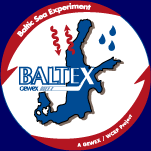|
BALTEX Workshop on the Utility of Regional Climate Models
at SMHI, Norrköping, 23 January 2008
Summary
The workshop was the start-up event of the recently approved new BALTEX Working Group on the Utility of Regional Climate Models (RCM), chaired by Markus Meier (SMHI, Sweden). It was held in conjunction with the 22nd BALTEX Science Steering Group meeting at the SMHI in Norrköping, Sweden. The workshop which was open to interested participants was attended by more than 50 scientists from Sweden, Germany, Denmark, Poland, Estonia, Russia and Belarus. This demonstrated the wide resonance in the research community and the interest in the key objective of the new BALTEX Working Group on the Utility of Regional Climate Models, namely to infer added value from regional climate models as compared to global climate models.
The presentations demonstrated the state of the art in regional climate modelling in Northern Europe, with examples from SMHI´s Rossby Centre (Kjellström and Bärring), and from recent international projects like PRUDENCE and ENSEMBLES (Lorenz, Christensen) and other international initiatives like CEOP/GEWEX (Rockel) and ERAMESAN (Jansson and Persson). Added value for RCMs was demonstrated by the presentations focussing on coupling wave physics to RCMs (Rutgersson-Owenius), on the use for hydrological applications (Andreasson), and particularly on coupling marine (Meier) and terrestrial (Klemedtsson, Smith) biogeochemical models to RCMs.
A lively discussion evolved around the question what the added value of RCMs are and could be. The improved coupling of different components of the Earth system into the RCMs was considered be a challenge for the future. The integration of biogeochemical processes into RCMs was shown to be a good example in the attempt to arrive at a regional Earth System Model. This was demonstrated by the fact that 3 presentations dealt with the extension of RCMs to biogeochemical (rep. ecological) processes.
Chronological list of speakers and presentations as pdf
Erik Kjellström and Lars Bärring, Swedish Meteorological and Hydrological Institute, Norrköping, Sweden
Status of dynamical downscaling at the Rossby Centre and future plans
Philip Lorenz, Max-Planck-Institute for Meteorology, Hamburg, Germany
Regional climate change simulations from Ensembles
Burkhardt Rockel, GKSS-Research Centre Geesthacht, Germany
The Inter-Continental Transferability Study as part of CEOP/GEWEX
Ole Bøssing Christensen, Danish Meteorological Institute, Copenhagen, Denmark
Validation and model weighting for PRUDENCE and ENSEMBLES simulations
Anna Jansson and Christer Persson, Swedish Meteorological and Hydrological Institute, Norrköping, Sweden
Meso-scale reanalysis of precipitation, temperature and wind over Europe –First attempt based on ERAMESAN and an outlook for future initiatives
Leif Klemedtsson, Göteborg University, Göteborg, Sweden
Tellus: The Centre of Earth System Science at Göteborg University
Johan Andreasson, Swedish Meteorological and Hydrological Institute, Norrköping, Sweden
On the need of dynamical downscaling for hydrological applications
Markus Meier, Swedish Meteorological and Hydrological Institute, Norrköping, Sweden
Scenarios of the Baltic Sea ecosystem calculated with a regional climate model
Benjamin Smith, Lund University, Lund, Sweden
Land surface dynamics and biogeochemistry in RCMs: state of art and future prospects
Anna Rutgersson-Owenius, Uppsala University, Uppsala, Sweden
A coupled wave-atmosphere RCM
|

